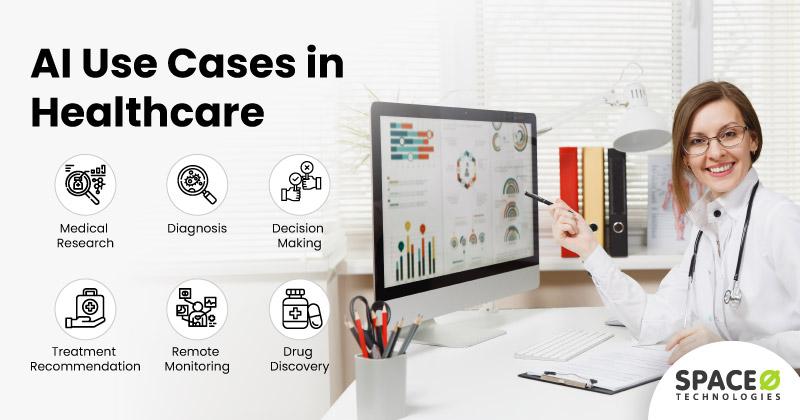

The transformative power of Artificial Intelligence (AI) is reshaping industries across the globe, but perhaps nowhere is its potential more evident than in the healthcare sector. From research and diagnostics to treatment and administration, AI’s ability to quickly process vast amounts of data offers a myriad of opportunities to enhance patient care, streamline operations, and push the boundaries of medical science.
Being a trusted AI software development company, we specialize in creating customized AI solutions for organizations across industries. Based on the market research and our experience, we have described how AI is impacting the healthcare industry. In this article, we have described 10 pivotal areas where AI is making a marked difference in healthcare, emphasizing not only the current innovations but also the promising future this synergy holds.
Contents
Artificial Intelligence (AI) is bringing wide changes to healthcare through its unparalleled ability to rapidly analyze massive amounts of data and provide actionable insights far beyond human capability. Here is a deeper look at 10 areas undergoing profound transformation due to applied AI.
Advancements in artificial intelligence are transforming medical research in impactful ways. Natural language processing and machine learning algorithms can analyze massive volumes of data from published studies, clinical trials, and human modeling simulations. This provides invaluable insights that assist researchers in driving breakthrough discoveries and bringing treatments to market faster. AI is able to detect obscure patterns and surface hidden connections in complex healthcare data that humans alone often overlook.
By augmenting researchers with advanced algorithms capable of synthesizing insights from huge datasets, AI is significantly accelerating medical research. It allows more informed decisions on which avenues to pursue and enables pivoting earlier when needed. AI is driving innovation that gets safe, effective treatments to patients who need them most in a more timely and cost-effective manner. It promises to transform the speed at which discoveries are made to combat disease.
AI is proving invaluable in healthcare by enhancing the analysis of patient data from sources like medical records, scans, and lab tests. Advanced AI techniques can process massive amounts of patient data and uncover crucial insights that human practitioners may initially miss. Reviewing all this information allows AI systems to spot discrepancies, gaps, biases, and missing or unclear data that could negatively impact diagnostic accuracy and treatment.
By combining AI’s data processing capabilities with human expertise, patient care can become more preventive, accurate, and personalized. AI helps create a more holistic view of each patient so clinicians can make better-informed decisions. Integrating AI analysis into healthcare leads to earlier detection, improved outcomes, and more lives saved. It’s a powerful tool for augmenting human clinicians.
Want to Hire AI Developers for Your Healthcare Solution?
Let’s talk. We are a leading AI development company, having experience in developing AI-driven solutions for small to large-scale businesses.
Artificial intelligence is ushering in major improvements to medical decision-making that directly benefit patients. AI systems are able to synthesize and analyze a vast array of health data and medical knowledge that exceeds human cognitive capacity. This allows AI to provide doctors with crucial decision-support tools that make treatments safer, faster, and more personalized.
By combining physician expertise with data-driven AI insights, better-informed care decisions can be made. Dangerous errors are prevented while treatment efficacy and efficiency improve. AI’s ability to process volumes of data and variables allows it to supplement doctors with alerts, treatment suggestions, and diagnostic odds that maximize positive patient outcomes. It is an invaluable asset in advancing modern medical decision-making.
Artificial intelligence allows doctors to provide far more personalized and optimized treatment plans tailored to each patient’s unique needs. By processing genetics, biomarkers, full medical history, and real-time patient data, AI systems can recommend the most promising therapies for every individual. This level of personalization would not be possible manually.
With AI assistance, doctors can now provide care plans customized to the individual’s genetics, health markers, and changing conditions. This enables truly personalized medicine tailored to each patient for optimal outcomes. AI-empowered treatment recommendations are the future of data-driven, precision healthcare.
AI is enabling revolutionary remote patient monitoring capabilities that improve preventive care. Machine learning analyzes data streams from wearable sensors to continuously monitor vital signs, movement, sleep patterns, and emerging symptoms around the clock. This allows early detection of trouble and automated alerts to providers.
With AI-powered remote monitoring, patients can be observed in real-time outside of medical facilities. Subtle changes identified early by AI algorithms increase opportunities for preventive interventions versus reactive treatments. AI is enabling continuous care that improves outcomes by keeping providers informed of the earliest indications of trouble.
Artificial intelligence is bringing about a new era in drug discovery and pharmaceutical research. AI enables breakthroughs not possible before by enhancing and expediting every step of the process. From initial discovery to preclinical testing to molecular engineering, AI allows treatments to be developed faster and smarter than ever.
From exponentially expanding the scale of initial discovery to simulating human trials to designing drugs from scratch, AI empowers pharmaceutical innovations with immense life-saving potential. By enhancing each phase, AI enables the development of tailored cures and therapies faster than previously achievable. It marks a new frontier in the quest to treat diseases and save lives.
Artificial intelligence is proving invaluable for identifying at-risk patients before symptoms manifest. By analyzing immense health data, AI empowers providers with unprecedented early disease prevention capabilities that can save lives.
AI enables proactive preventative care by detecting risks ahead of time through the analysis of vast health data. Whether through statistical analysis, natural language processing, or computer vision, AI identifies patients requiring early intervention before conditions escalate. By augmenting human capabilities, AI is driving a new era of data-driven preventive medicine.
Artificial intelligence is automating time-consuming administrative tasks in healthcare to improve efficiency, expand access, and allow clinical teams to focus on higher-value work. AI virtual assistants use natural language processing to handle booking, billing, refills, patient portal inquiries, and other frequent requests 24/7 through conversational interfaces. Intelligent workflow management systems route tasks, documentation, approvals, and hand-offs between human staff to optimize complex office processes. AI chatbots field high volumes of routine customer service and intake questions while triaging more advanced issues to the appropriate staff.
By automating repetitive, high-volume administrative work, AI allows healthcare professionals to focus on critical clinical care. Intelligent assistants expand patient access while coordinated workflow systems and chatbots optimize behind-the-scenes office processes. AI enables healthcare organizations to work smarter – not harder.
Artificial intelligence is rapidly transforming medical imaging by enabling more accurate and faster analysis than human capabilities allow. Advanced deep learning algorithms can process CT scans, x-rays, MRI images and other visuals to detect subtle indicators of hundreds of diseases and abnormalities better than expert review. The more medical images the AI processes, the more precisely it can identify concerning features and patterns. AI triage helps prioritize the most urgent cases for radiologists while numerical assessments provide physicians with percentage likelihoods of different conditions reflected, including clues initially missed. From dermatology to ophthalmology, AI has proven uniquely skilled at both speed and precision across diverse imaging modalities.
By augmenting human analysis, AI is enabling earlier and more reliable evaluation of medical imaging. Deep learning models excel at feature extraction, spatial analysis and pattern recognition integral to medical visuals. Doctors receive AI support in surfacing concerns and triage priorities. Continued AI training produces ever-more discerning diagnostics. Medical imaging powered by AI is driving faster intervention through superior image understanding.
Artificial intelligence is optimizing pharmaceutical manufacturing through increased automation, process improvements, quality control, and regulatory compliance. Intelligent robotics automate repetitive production tasks with precision while machine learning algorithms perform real-time quality assessments to predict equipment needs and detect defects early. AI simulations model proposed process changes without disrupting operations. Expert systems codify best practices and regulations to guide decisions. The Internet of Things connects machines for tracking and monitoring. Most transformative is the emerging ability to print personalized pills, powders, and injections with AI-controlled fabrication adjusted continuously in response to each patient’s changing needs. Across R&D, production, packaging, and more, AI introduces new capabilities that save costs while guaranteeing each drug’s integrity.
From intelligent automation to quality assurance to IoT connectivity, AI is driving significant advancements across pharmaceutical manufacturing. Production is faster, safer, more efficient, and fully tailored to individual patient requirements thanks to AI capabilities. Introducing intelligent oversight unlocks new potential in the supply chain – from R&D through packaging. AI-powered drug fabrication guarantees quality, compliance, and customization.
Want to Build an AI-driven Healthcare Solution?
Let us help you. Contact us, describe your needs, and get your software development started for your healthcare institute.
Read our FAQ section to clear your doubts.
AI-driven health solutions typically employ advanced encryption methods and adhere to international health data standards, such as the Health Insurance Portability and Accountability Act (HIPAA). While these measures substantially enhance data protection, it’s essential for users and providers to ensure that any AI tool or platform they adopt is compliant with the latest data protection regulations and undergoes regular security audits.
The integration of AI into healthcare, though promising, comes with its set of challenges. Data privacy sits at the forefront: ensuring AI systems handle health records discreetly and securely is vital. Beyond privacy, there’s the challenge of accuracy. The healthcare sector can’t afford errors, so AI algorithms must be rigorously tested to ensure they don’t inadvertently misdiagnose or misinterpret data. Moreover, the healthcare community requires extensive training to fully harness AI capabilities without becoming overly reliant on them.
AI is ushering in a new era of personalized medicine. Traditionally, medical treatments followed a one-size-fits-all approach. With AI’s capacity to analyze and interpret vast genetic datasets, medical professionals can now tailor treatments based on an individual’s genetic composition. This not only increases the likelihood of treatment efficacy but also reduces the adverse side effects that arise from treatments that may not be optimal for a particular genetic profile.
Wearable technology has become a significant player in proactive health management. Beyond merely counting steps or tracking heart rates, advanced wearables powered by AI algorithms can interpret biological data in real time. For instance, an AI-driven smartwatch might detect irregularities in heartbeat patterns, potentially identifying conditions like atrial fibrillation. These devices don’t just collect data; they provide actionable insights, alerting users and even healthcare providers to potential health anomalies requiring intervention.
The healthcare sector is inundated with data, be it medical records, diagnostic images, or patient feedback. Manual analysis of such data is time-consuming and often lacks precision. Enter AI. Its ability to swiftly and accurately analyze vast datasets makes it indispensable. With AI, doctors can diagnose diseases earlier, administrative tasks can be streamlined, and treatments can be better targeted, leading to an overall enhanced healthcare experience for both providers and patients.
As we’ve journeyed through this exploration, it’s clear that AI’s role in healthcare isn’t just another passing phase; it’s a dynamic change carving a new path for the future of medicine. The ten areas we spotlighted show just how deeply AI influences everything, from enhancing the patient experience to speeding up drug discoveries and sharpening diagnostic tools.
The beautiful partnership between AI and healthcare is ushering in a new age of personalized treatments and early interventions, streamlining the entire medical landscape. As technology keeps pushing boundaries, we can only expect more innovative breakthroughs on the horizon, further emphasizing AI’s essential role in creating a healthier and more enlightened tomorrow for us all.
What to read next